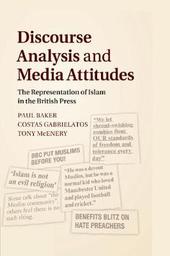
|
Discourse Analysis and Media Attitudes: The Representation of Islam in the British Press
Paperback / softback
Main Details
| Title |
Discourse Analysis and Media Attitudes: The Representation of Islam in the British Press
|
| Authors and Contributors |
By (author) Paul Baker
|
|
By (author) Costas Gabrielatos
|
|
By (author) Tony McEnery
|
| Physical Properties |
| Format:Paperback / softback | | Pages:292 | | Dimensions(mm): Height 230,Width 150 |
|
| Category/Genre | Semantics
Sign languages, Braille and other linguistic communication |
|---|
| ISBN/Barcode |
9781108790611
|
| Classifications | Dewey:305.6970941 |
|---|
| Audience | | Professional & Vocational | |
|---|
| Illustrations |
52 Tables, black and white; 36 Halftones, unspecified; 36 Halftones, black and white; 4 Line drawings, black and white
|
|
Publishing Details |
| Publisher |
Cambridge University Press
|
| Imprint |
Cambridge University Press
|
| Publication Date |
12 December 2019 |
| Publication Country |
United Kingdom
|
Description
Is the British press prejudiced against Muslims? In what ways can prejudice be explicit or subtle? This book uses a detailed analysis of over 140 million words of newspaper articles on Muslims and Islam, combining corpus linguistics and discourse analysis methods to produce an objective picture of media attitudes. The authors analyse representations around frequently cited topics such as Muslim women who wear the veil and 'hate preachers'. The analysis is self-reflexive and multidisciplinary, incorporating research on journalistic practices, readership patterns and attitude surveys to answer questions which include: what do journalists mean when they use phrases like 'devout Muslim' and how did the 9/11 and 7/7 attacks affect press reporting? This is a stimulating and unique book for those working in fields of discourse analysis and corpus linguistics, while clear explanations of linguistic terminology make it valuable to those in the fields of politics, media studies, journalism and Islamic studies.
Author Biography
Paul Baker is Professor of English Language in the Department of Linguistics and English Language at Lancaster University. Costas Gabrielatos is a Senior Research Associate in the Department of Linguistics and English Language at Lancaster University. Tony McEnery is Professor of English Language and Linguistics in the Department of Linguistics and English Language at Lancaster University.
Reviews'This book investigates the ways in which the lives and actions of Muslims and Islam are represented in the British press. The authors use the corpus method of analysing vast amounts of data to weigh the overall impact of the media coverage. This approach offers stimulating new insights which offer useful suggestions as to the ways in which the current situation might be improved.' Rt Hon Charles Clarke, Former UK Home Secretary 'This study is destined to become a classic. It provides detailed evidence of how press influence works, and elegantly demonstrates the strength of corpus linguistics as a research tool.' Susan Hunston, University of Birmingham 'Understanding the representation of Islam in the Western media is a major challenge that demands a balanced approach supported by real data. The methods that enhance this book throughout are rich in insight, comprehensive in vision and evidential at their core. Integrating large corpus-linguistic-informed databases with the qualitative accents of critical discourse analysis the book underlines the centrality of language use to the way we read media discourses and results in humanities scholarship at its very best.' Ronald Carter, University of Nottingham 'This excellent and very accessible book not only provides key insights into a topic of major social and political importance, it also clearly demonstrates the power of corpus linguistics to provide hard factual evidence for critical discourse analysis. This is a major contribution, not only to understanding of Islamophobia in the UK press, but also to the social sciences and discourse analysis as a whole.' Guy Cook, King's College London '[This book] uses corpus linguistic analysis to show how selective linguistic patterning in newspapers creates an overwhelmingly negative point of view in contemporary press coverage of Islam. Research approach and method are precisely defined, analytic techniques clearly explained and illustrated, and inferences from data weighed up in meticulous and even-handed exposition. The book demonstrates in exemplary fashion how linguistics can contribute to wider social debates; it will be of value not only to scholars and students in corpus linguistics and discourse analysis but also in other fields concerned with public representations of Islam or with problems of media responsibility.' Alan Durant, Middlesex University 'What sets this discourse analysis apart from its predecessors is its completeness: the authors' sample is not a selection of newspapers, accommodating the political stance of the outlet (left-leaning, right-leaning), the format (tabloid, broadsheet), or a narrow period; neither, having aggregated all the articles that mention the topic, do they thin the sample by random or purposive selection. Their corpus includes all the major daily newspapers and all the articles published therein that refer to Islam and Muslims between 1998 and 2009. Although the authors allow that some articles may have slipped through their net, the corpus they compiled contains 200,037 articles.' Michael B. Munnik, Journalism and Mass Communication Quarterly
|